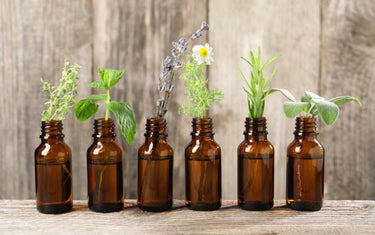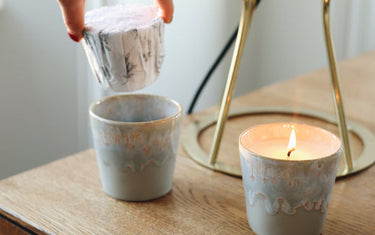5 min read / 15 June 2025 / yasmin sharp
Essential Oil Facts and Myths
We debunk the most common misconceptions about essential oils while providing science-based facts on safe usage, proper dilution, and realistic expectations for their therapeutic benefits.
Share this post

There are lots of myths about essential oils and knowing what to believe or ignore is not always easy.
While taking advice from others based on their personal experience can be very helpful, it’s also important to differentiate between fact and fiction. After all, these oils will be interacting with your body on some level, whether it's via topical application of diffusion, so you need to be up to speed about how to use them safely.
We examine some of the misconceptions about essential oils and give you the facts behind the myths.

Common myths about essential oils
1. Essential oils are natural and always safe for skin
One of the most common myths about essential oils is that because they are sourced from plants, flowers and fruits this makes them completely safe to use.
In the majority of cases, people will not experience any issue when using an essential oil, provided it is applied correctly. But there can be instances where people with sensitive skin or allergies to particular components of the oil might see a reaction.
In their purest form, essential oils are extremely potent, which is why you should always mix them with a carrier oil before applying to your skin.
If you are a first-time user or concerned about an oil’s compatibility with your skin, it is recommended that you complete a patch test to check for any reaction.
2. Essential oils can cure diseases
This is a dangerous myth to believe and one that should not be given any credibility.
Whilst there is a fair amount of anecdotal stories from users who claim that an essential oil has improved a particular condition, there is not yet enough science-based evidence to prove that they can definitely cure ailments and illnesses.
Research has uncovered some possible therapeutic benefits to using essential oils, while studies have suggested they could also have the potential to aid medical professionals.
But in most cases, more research is needed to establish stronger links that categorically prove essential oils possess medicinal properties.
3. Ingesting essential oils can improve your health
The highly concentrated nature of essential oils means that they should never be ingested. Drinking or swallowing an essential could pose serious risks to your digestive tract or liver, which may lead to further medical complications.
There are food grade essential oils available to buy (these are not available at Nikura) which can be used in cooking and beverages, making them safer to ingest. These are not essential oils in their purest form as they have been altered to make them safe for consumption. If an essential oil is not clearly labelled as being ‘food grade’ it should not be ingested in any form.
Even if you are thinking of consuming food grade essential oils, it is recommended that you first speak with a medical professional. They will have a better idea of your medical history and can offer advice based on what is likely to be best for your health.
4. The more essential oil you use, the better the effect
While in principle this appears to be a sound idea, the opposite is true. The best method for using essential oils is to adopt a “less is more” approach, as this will safeguard your skin while ensuring you can enjoy the therapeutic benefits.
Precise and minimal application usually helps to produce the best results, while also helping you get more from the oil for longer.
For example, if you want to create a more relaxed atmosphere to combat stress and anxiety, placing a few drops on a pillow before you go to bed can work wonders. This should be strong enough to calm the senses without overwhelming them, whilst also creating a lovely scent for the room.

5. You can apply essential oils directly to your skin
We touched on this briefly above, but it is important to reiterate that essential oils should never be applied to your skin without first being diluted with a carrier oil.
Essential oils are extremely strong in raw form and even if you do not have sensitive skin or a known allergy, it is highly likely that you will damage your skin if they are not mixed correctly.
The most common reaction is redness, swelling, irritation or itchiness, but in more rare and extreme cases, it can lead to diarrhoea, dizziness/fainting, fast heartbeat or shortness of breath.
If you experience any kind of allergic reaction, you should stop using the oil and seek medical attention as soon as possible.
When mixing an essential oil with a carrier oil, it is generally advised that you follow a 2% dilution rule. For example, for every 5 drops of essential oil you use, ensure it is mixed with at least 10 ml of carrier oil (you can dilute it further if you need).
6. Oil purity means it is high quality
When shopping around for your essential oils, the first thing to look for are products that are labelled as being 100% pure. This will mean that no other extracts or ingredients have been added to the oil after it has been extracted.
However, the purity of an oil isn’t the only way to judge its quality. Its chemical profile, along with how it has been sourced and extracted all play a central role in determining its overall grade and effectiveness. Plant sources, production and storage will also impact the quality of the oil.
Buying from a reputable supplier will go a long way to giving you the assurances you need about oil quality. The product should come with information about how to use it, along with a Safety Data Sheet which breaks down the composition, physical and chemical properties, health effects and environmental impact of the oil.
7. Essential oils last forever and get better with age
This myth about essential oils likely comes from the belief that because they are from natural sources, this means they have an almost endless lifespan.
Unfortunately, like most products, essential oils do expire and will deteriorate in quality over time. It can become very unsafe to use essential oils after the expiry date. Most oils have a shelf life of around 1-2 years, although this can be impacted by several factors.
It’s important to ensure your oils are stored away from direct light and heat sources in airtight bottles/containers, as this will give them the protection they need.
If you notice any colour or scent changes, it is likely that the oil is starting to go off, so you may want to think about getting a new batch.

Final thoughts
If you use essential oils for your skin, ensuring you dilute and apply them in the right way will reduce the risks.
Not doing so could put your health at risk and cause an allergic reaction. Essential oils can help to evoke a sense of calm or promote rejuvenation but should never be thought of as cures for illnesses and diseases.
Similarly, they should never be ingested or used in excess, as you shouldn’t need more than a few drops to enjoy their many aromatherapeutic benefits.










